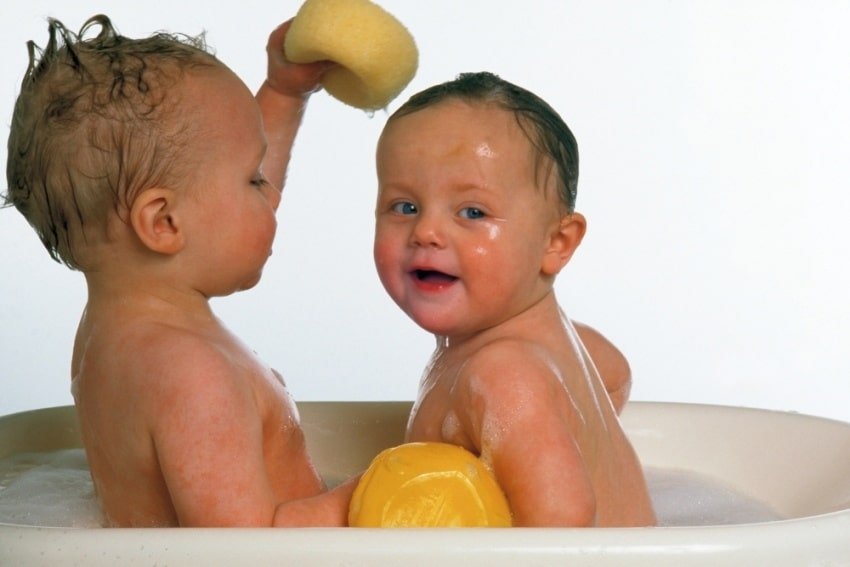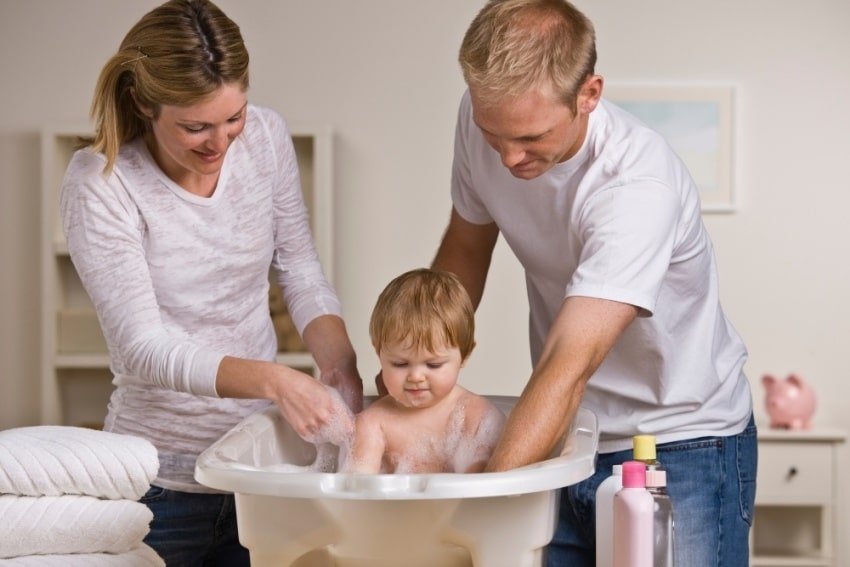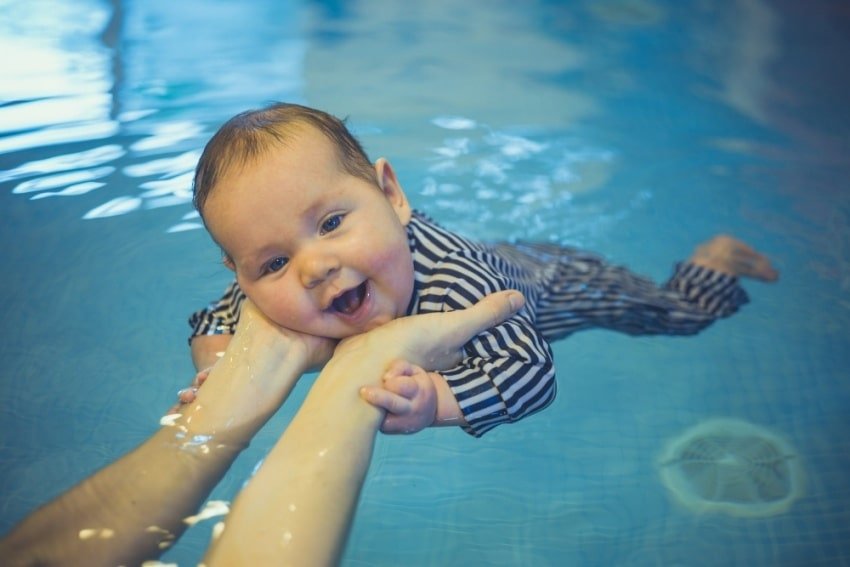It’s inevitable that your little one will swallow bathwater! This could be when they’re an infant and open their mouth at the same time that you pour the cup over their head.
It might be intentional when they are older because babies explore things through touch and taste.
Babies swallowing anything that isn’t meant to be ingested can be alarming, but most little ones will be perfectly fine if they get a mouth full of bathwater.
In this article
How Much Did The Baby Swallow In The Bath?
The amount of water the baby swallowed in the bath can easily tell you whether you might have a problem on your hands. A small amount of bathwater that gets swallowed through the mouth is not a reason for concern.
Although most shampoos and baby body washes shouldn’t be eaten, the amount that a little one would have to swallow is significantly more than a mouth full in most cases.
However, if you’re concerned, contact the poison control center at 1-800-222-1222. They’re available 24 hours a day. This is the number I called when someone did not close the Ibuprofen all the way and my daughter got into it.
The person on the phone was able to quickly tell me how much it would take for her to require emergency care, and what symptoms to look for. Poison Control Center operators can do this with almost anything, including baby shampoo.
Opt For Non-Toxic Shampoos To Make Sure Your Baby Doesn’t Swallow Toxic Ingredients
One of the main concerns for parents, when their baby swallows bathwater, is what is in the bathwater. For example, Johnson’s baby shampoo previously contained formaldehyde.
It was removed after it made the news due to customers being concerned. If no one had pointed out that ingredient, it would still be in the shampoo.
To make sure that your little one does not ingest toxic chemicals, avoid using them. Instead, opt for organic or non-toxic shampoo. This won’t hurt your baby if they accidentally swallow a mouth of it.
Some companies intentionally leave out the primary toxic ingredients that would be concerning while still including a few artificial ones that aren’t known to cause harm. These are also considered safe.
- 2 in 1 formula: This all in one baby shampoo plus body wash is designed to make parents’ lives easier; This baby wash is all you need for everyday bathing routines; It cleans, gently soothes, and nourishes babies’ skin and hair without over drying
- Gentle, mild, & tear free: Gentle enough for daily use, this tear free formula is made without sulfates or parabens; Our mild 2 in 1 formula is designed to clean the entire body from head to toe, leaving skin moisturized and hair soft and clean
Prices pulled from the Amazon Product Advertising API on:
Product prices and availability are accurate as of the date/time indicated and are subject to change. Any price and availability information displayed on [relevant Amazon Site(s), as applicable] at the time of purchase will apply to the purchase of this product.
Dry Drowning Is Always A Concern
Many parents are concerned and many lose sleep about dry drowning. While this does happen, it is extremely rare.
View in gallery
Dry drowning is the result of water getting into the lungs. This can also cause bacterial infections and pneumonia. Yet, it’s important to note that this cannot happen from swallowing bath water.
When something is swallowed, it goes into the stomach, not the lungs. When we breathe in, things go into the lungs. In order for this to occur, your child has to inhale the bathwater.
Common incidences of babies inhaling bathwater might be if your baby face plants in the water. If the water scares them when you pour it over their heads, they might breathe in heavily through their nose and inhale bathwater.
Head To The ER If You’re Concerned
If you’re googling things about dry drowning and ready to stay up all night, simply head to the hospital now. It’s always better to be safe instead of sorry. A doctor can properly evaluate your little one and determine if there is a problem.
For example, when my son was younger he walked into the pool. He saw the edge of the concrete and three-year-old him simply walked off the edge and into the water.
A lifeguard immediately jumped in to save him. He was with our church pastor at the time, who said he kept a close eye on him afterward and he seemed fine.
Me, being the worrying mom that I am, still took him to the hospital. I could not stop thinking about dry drowning.
The doctors went over symptoms, how long ago it was that he fell in the pool, etc. In the end, he was deemed fine. I slept through the night and he was, indeed fine.
Symptoms Of Complications
We all are not blessed with medical insurance or small co-pay amounts. This can make us stop and think twice before heading off to the emergency room. Those medical bills for unnecessary trips to the ER can quickly mount up!
This is the most common reason that parents hesitate before a trip to the hospital. If your child is exhibiting any symptoms or you need peace of mind, it’s not a waste when their life could be on the line.
However, if you would like to know what to watch out for, here are common signs and symptoms of dry drowning:
- Coughing
- Lethargy
- Fatigued
- Blue skin
- Wheezing
- Shallow breathing
- Choking or gagging
- Hard time speaking
Other not so common symptoms may also be seen, such as a headache. If you notice anything that is not normal behavior for your little one, give the doctor a call or head to the hospital.
Baby Swallowing Bathwater Prevention Tips
The key to dealing with this situation is avoiding it altogether. There are several prevention tips that you can implement now to make sure that you never have to deal with this situation or worry about it a second time.
View in gallery
Prevent Babies From Swallowing Bathwater By Not Leaving Them Alone
Once your little one is old enough to lift their head up, sit up on their own and you’re still only putting two inches of bathwater in the tub, it might make sense that it would be safe to step outside of the bathroom for a moment.
You might also stay in the bathroom, cleaning up while your little one plays. This can still be dangerous.
Infants can easily fall over in the bathtub, resulting in them inhaling water. This means that in two seconds your baby can tip over and inhale bathwater.
One of the best ways to prevent this is to stay right by their side. If you have to leave the bathroom, take your little one with you.
Prevent Baby Swallowing Bathwater With A Suction Seat
Suction seats are ideal for babies that can sit up. They suction safely to the bottom of the bathtub. Their design is similar to that of a high chair because there are openings that the baby’s legs slide right through.
This makes bath time easier, and it’s very safe. Swivel suction seats let you turn the baby around while still in the seat to make washing them off easier too!
- Material The Baby Bath Seat is made of durable PP+TPR plastic. The ergonomic backrest supports the babys back It can be used as childrens play chair, bathtub support cushion, feeding safety seat and learning chair
- Cute design The front part of baby plastic bathtub seat can help your baby provide hands-free support for your baby during the bath. And you can also place your child’s favorite toys to help your child divert attention, so that your child is no longer afraid to take a bath, or fall in love with it, so that your child can maintain a happy mood during the bath
Prices pulled from the Amazon Product Advertising API on:
Product prices and availability are accurate as of the date/time indicated and are subject to change. Any price and availability information displayed on [relevant Amazon Site(s), as applicable] at the time of purchase will apply to the purchase of this product.
Gather Everything Needed Before Bath Time
More often than not, parents leave their children alone for just a minute because they forgot something for the bath. This could be a hooded towel in the dryer, a favorite bath toy in their room, or the baby shampoo itself.
To prevent this, make sure to gather what you need before running the bathwater. Things you’ll need include:
- Cup for rinsing
- Baby shampoo
- Baby body wash
- Baby bathtub or bath seat
- Bath toys
- Diaper for after the bath
- Hooded towel or baby bathrobe
When you have everything you need, you won’t consider taking a chance to run in the next room real quick. If you forget something, take your little one with you.
Other people in the household can come into the bathroom for a minute while you leave the room too.
Teach Your Baby To Swim
Enroll your little one in swim classes to help prevent accidents. Studies have revealed that babies under a year old can save themselves in accidents if they know how to swim.
View in gallery
Granted, this might not help in an accident with them inhaling water because they are surprised, but it could save their life if they fall into a pool. Most community centers that offer classes for children also offer baby swim classes.
Bath Hats Prevent Water From Getting Near The Baby’s Face
These products instantly help protect your little one from dry drowning. They are plastic and sit on the baby like a little hat.
The downward slope guarantees that water will go down the hat, and then into the bath when you rinse off your little one instead of down their face where they can accidentally inhale it.
- Material: Soft environmentally friendly EVA resin, durable and resistant to aging.
- Functions: It can protect the kids eyes and ears from water during bath or haircut, make a funny experience for the kids.
- Light design, Safety thickening. Light in weight, 0.3cm thickness elasticity, toughness enough.
Prices pulled from the Amazon Product Advertising API on:
Product prices and availability are accurate as of the date/time indicated and are subject to change. Any price and availability information displayed on [relevant Amazon Site(s), as applicable] at the time of purchase will apply to the purchase of this product.
In Conclusion
If your baby swallows a small amount of bathwater, they will probably be fine. Concerned parents should at least call the poison control center. Inhaling water, on the other hand, can result in dry drowning on rare occasions.
If you are worried about this, go to the emergency department immediately. However, remember that this rarely happens. Don’t forget to use prevention strategies when you can!
Medical Disclaimer. All content and media on the MomInformed Website is created and published online for informational purposes only. It is not intended to be a substitute for professional medical advice and should not be relied on as health or personal advice.






